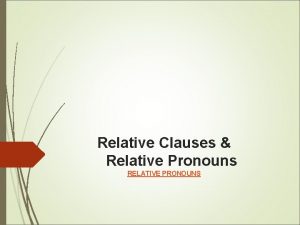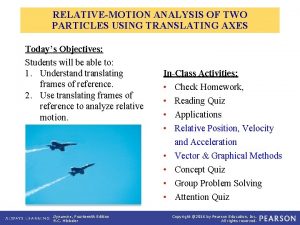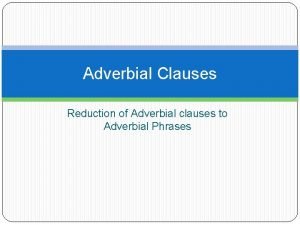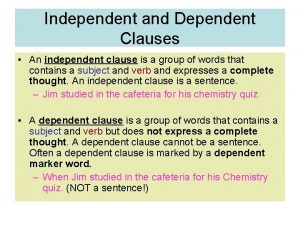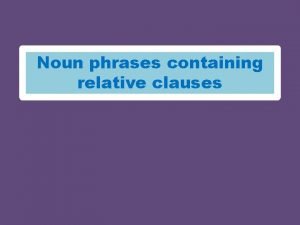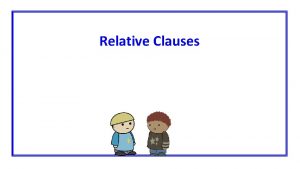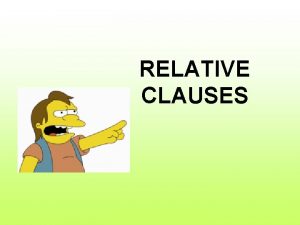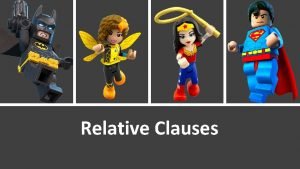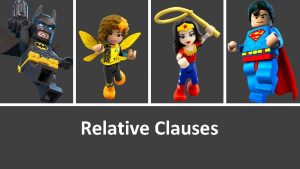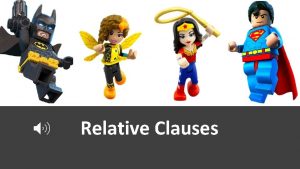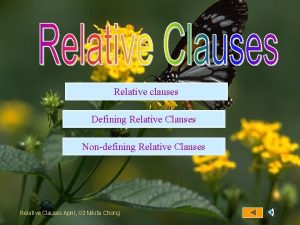RELATIVE CLAUSES Relative particles Who refers to people








- Slides: 8

RELATIVE CLAUSES

Relative particles Who – refers to people – (que, quien, el cual) Which – refers to things – (que, el cual) Where – refers to places – (donde) When – refers to time expressions (cuando) Whose – refers to possession. determines a noun (cuyo) Whom – referes to people when it is not the subject in the second clause. (que, quien, el cual)

Most important exercise: Join the following sentences by using a relative. Make any changes if necessary. “Lisa is reading books all the time. She lives in Paris”. STEP 1 Subraya lo que se repite en cada oración Lisa is reading books all the time. She lives in Paris. STEP 2 Tacha lo que se repite en la segunda oración. Lisa is reading books all the time. She lives in Paris.

STEP 3 Sustituir lo tachado por el relativo correspondiente. Lisa is reading books all the time. (who)lives in Paris. STEP 4 Mover el relativo detrás de lo que se repite en la primera oración. Lisa (who)is reading books all the time. lives in Paris. STEP 5 Copiar el resto de la segunda oración detrás del relativo y finalmente, el resto de la primera oración. Lisa who lives in Paris is reading books all the time

STEP 6 La oración de relativo va entre comas si el antecedente es un nombre propio o algo único. Lisa, who lives in Paris, is reading books all the time.

EXTRA NOTES Antecedente = SN que va delante del pron. relativo. Defining relative clause = La oración de relativo no va entre comas. Non-definig relative clause = La oración de relativo va entre comas. Aporta información adicional. Los relativos who, which se pueden sustituir por that en las non-defining relative clauses. Omisión del relativo (who, which): . Sólo en defining clauses. se puede omitir el relativo si no es el sujeto de la oración. Cuidado con las preposiciones. No puedes poner when o where junto con una preposición de lugar o de tiempo. That is the lake. The boys swam in the lake. That is the lake where the boys swam. That is the lake which the boys swam in.

Join the following sentences by using a relative. Make any changes if necessary. Here is a woman. She survived the tsunami. That new CD is great. You bought it. They have caught the tiger. It escaped from the zoo. The artist is very talented. He won first prize. Those are the neighbours. Their dog bit me. This is the town. I was born here. I´ll never forget the day. We met on that day. The article was about a child. Her mother had rescued her during the tsunami.

Key Here is the woman who survived the tsunami. That new CD, which you bought, is great. They have caught the tiger which escaped from the zoo. The artist who won first prize is very talented. Those are the neighbours whose dog bit me. That is the town where I was born. I´ll never forget the day when we met. The article is about a child whose mother had rescued her during the tsunami.
 Stage 15 relative clauses and relative pronouns
Stage 15 relative clauses and relative pronouns Types of relative clauses
Types of relative clauses Relative motion of two particles using translating axes
Relative motion of two particles using translating axes Restrictive clauses and nonrestrictive clauses
Restrictive clauses and nonrestrictive clauses Reduction of adverb clauses
Reduction of adverb clauses Independent clause meaning
Independent clause meaning Relative clauses with extra information
Relative clauses with extra information Nonrestrictive adjective clauses
Nonrestrictive adjective clauses Noun phrase with relative clause
Noun phrase with relative clause

